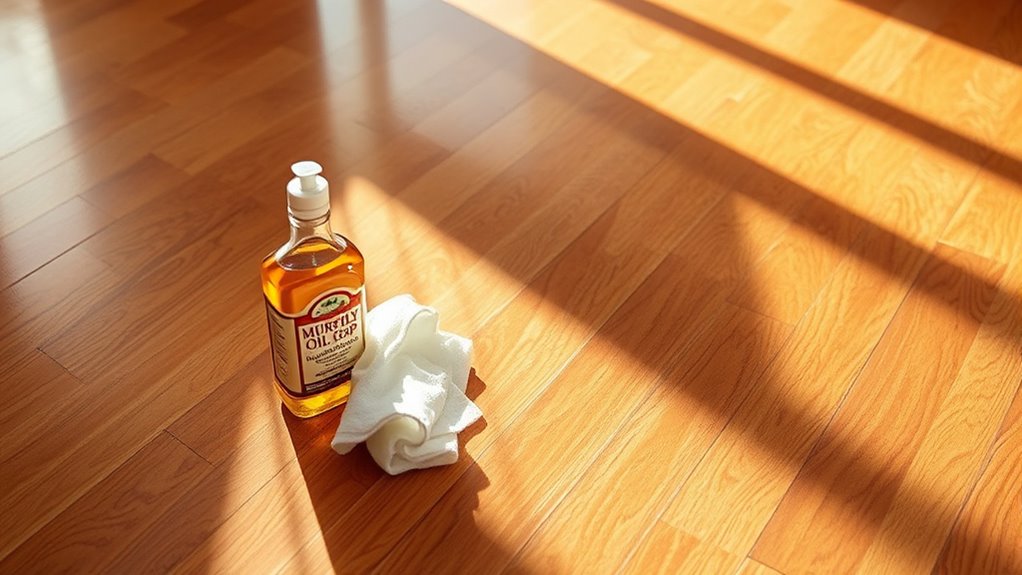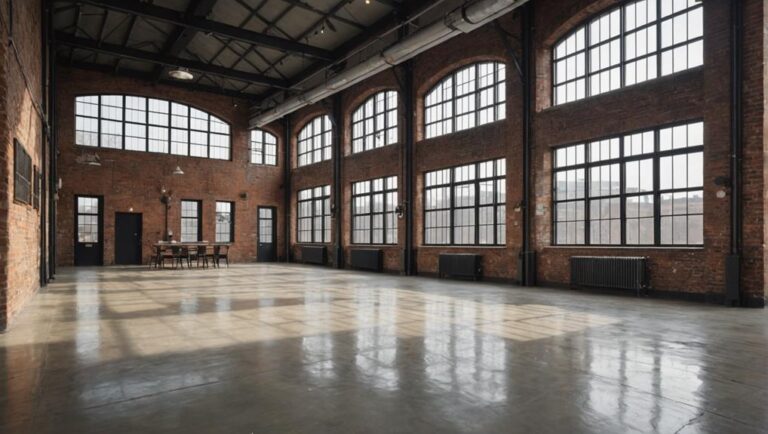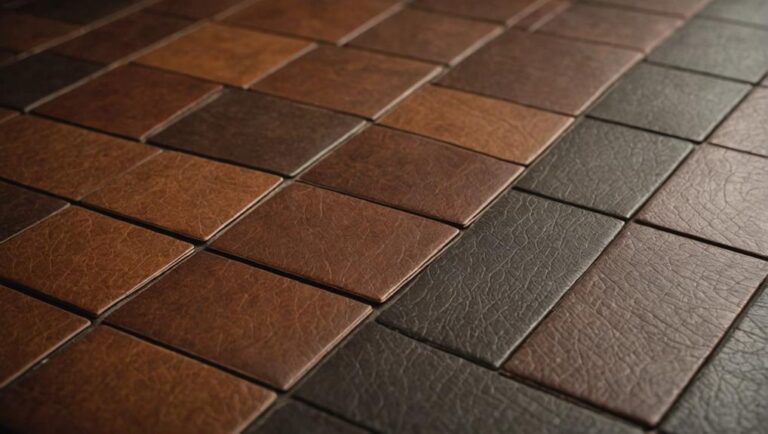Murphy Oil Soap is a great choice for cleaning hardwood floors because it’s specially formulated to lift dirt without stripping the wood’s finish. It uses natural oils to nourish your floors, preventing dryness and dullness. Just dilute properly—about ¼ cup per gallon of warm water—and mop with a damp, not soaking, cloth to avoid moisture damage. While effective and gentle, some finishes may react differently, so testing first is wise. Keep going to discover proper use and alternatives that protect your wood’s beauty.
What Is Murphy Oil Soap?
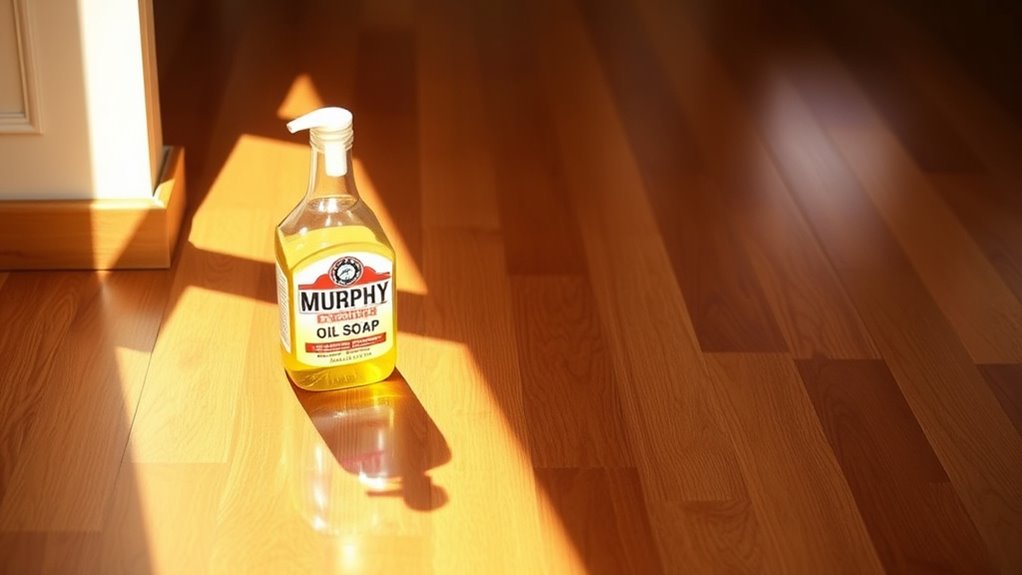
Murphy Oil Soap is a specially formulated cleaning product designed primarily for wood surfaces. When you choose Murphy Oil, you’re opting for a trusted solution known for its exceptional cleaning effectiveness on hardwood floors and other wood furniture. The soap’s unique blend of natural oils and gentle surfactants cleans dirt and grime without stripping the wood’s protective finish. This guarantees your floors stay vibrant while maintaining their integrity. You can easily dilute Murphy Oil Soap in water, making it simple to apply with a mop or cloth. Its non-toxic formula allows you to clean confidently, free from harsh chemicals. By using Murphy Oil Soap, you’re preserving your wood’s natural beauty and extending its lifespan with every cleaning session.
How Does Murphy Oil Soap Clean Hardwood Floors?
When you use Murphy Oil Soap on hardwood floors, its natural oil-based formula gently lifts dirt without stripping the wood’s protective finish. This oil soap not only cleans but also nourishes the floor, maintaining its shine and preventing dryness. To get the best results, dilute the soap properly and apply it with a damp mop, avoiding excess water that can damage the wood.
Cleaning Mechanism Explained
Although hardwood floors require gentle care, you can effectively clean them using a solution that balances strength and safety. Murphy Oil Soap works by combining natural oils and mild surfactants that lift dirt and grime without stripping the wood’s finish. When you dilute it properly, the soap penetrates surface debris while maintaining the floor’s protective layer. This guarantees cleaning effectiveness without compromising surface protection. The oils in the formula help condition the wood, preventing dryness and dullness. To maximize results, apply a diluted mixture with a damp mop—never saturate the floor—to avoid moisture damage. This mechanism lets you confidently clean your hardwood floors, preserving their natural beauty and durability while enjoying a fresh, residue-free surface.
Oil Soap Benefits
Because hardwood floors need both cleaning and conditioning, using an oil-based soap like Murphy Oil Soap offers distinct benefits that go beyond simple dirt removal. Its oil soap effectiveness lies in gently dissolving grime while infusing natural oils that nourish the wood. This dual action supports hardwood maintenance by preventing drying and cracking, preserving your floor’s natural luster.
| Benefit | Description |
|---|---|
| Deep Cleaning | Breaks down dirt without harsh chemicals |
| Conditioning | Oils penetrate wood fibers, enhancing durability |
| Residue-Free Finish | Leaves floors clean and non-sticky, maintaining shine |
Application Tips
To get the most out of Murphy Oil Soap on your hardwood floors, you’ll want to dilute it properly before use. This guarantees effective cleaning without leaving residue. Here are key application methods to follow:
- Mix 1/4 cup of Murphy Oil Soap with a gallon of warm water for safe, efficient cleaning.
- Use a damp mop—never soaking wet—to avoid water damage and maintain floor integrity.
- Clean regularly but avoid overuse; a weekly cleaning frequency is ideal for most homes.
- Rinse the mop frequently to prevent redistributing dirt and keep the solution fresh.
Benefits of Using Murphy Oil Soap on Hardwood Floors
Murphy Oil Soap offers a gentle yet effective cleaning solution specifically designed for hardwood floors. When you use it, you’re choosing an eco friendly cleaning product that minimizes harsh chemicals, allowing you to maintain a natural, safe environment in your home. Its formulation penetrates dirt and grime without stripping the wood’s finish, providing excellent surface protection. This means you can clean confidently, preserving both the integrity and shine of your floors over time. Plus, Murphy Oil Soap’s easy-to-rinse formula prevents residue buildup, ensuring a streak-free finish that enhances your floor’s natural beauty. By incorporating this product into your routine, you maintain a balance between thorough cleaning and protecting your hardwood’s lifespan, giving you freedom to enjoy spotless, durable floors effortlessly.
Potential Drawbacks and Precautions
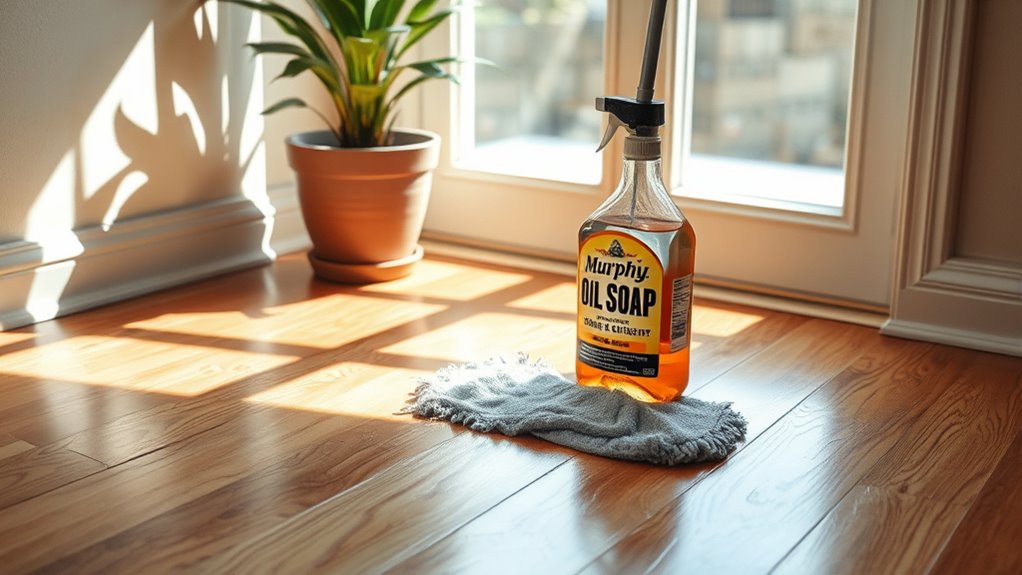
While Murphy Oil Soap is effective, you need to be cautious about residue buildup that can dull your hardwood floors over time. Some wood finishes may react poorly, so it’s important to test the soap on a small, inconspicuous area first. Always follow proper dilution instructions to avoid damaging your floor’s surface.
Residue Buildup Risks
Although Murphy Oil Soap is praised for its gentle cleaning properties, using it improperly can lead to residue buildup on hardwood floors. This can cause residue concerns that not only dull your floor’s appearance but also increase the risk of surface damage over time. To avoid these issues, you should:
- Dilute the soap properly according to the instructions to prevent excess residue.
- Use a damp, not wet, mop to avoid oversaturation and soap pooling.
- Rinse the floor occasionally with clean water to remove any leftover soap film.
- Avoid frequent heavy applications; regular light cleaning is more effective and safer.
Wood Finish Sensitivity
Because different hardwood finishes react uniquely to cleaning agents, you’ll need to contemplate the type of finish on your floors before using Murphy Oil Soap. Wood finish types like polyurethane, wax, or shellac each have varying degrees of chemical sensitivity. Murphy Oil Soap is generally compatible with sealed finishes like polyurethane but may not suit waxed or shellacked surfaces, potentially causing dullness or damage. To verify finish compatibility, always test the soap on a small, inconspicuous area first. Avoid using it on floors with unfinished or delicate finishes, as the soap’s oil-based formula could penetrate and alter the wood’s appearance. Being mindful of your floor’s finish type helps maintain its integrity and prevents costly restoration, so proceed with caution to enjoy both cleanliness and freedom in your hardwood floor care routine.
Proper Dilution Importance
If you want to preserve your hardwood floors’ finish and avoid unwanted residue, you’ll need to pay close attention to how you dilute Murphy Oil Soap. Incorrect dilution ratios can compromise cleaning effectiveness and leave your floors sticky or dull. To maintain ideal results:
- Always follow manufacturer-recommended dilution ratios; typically, 1/4 cup of soap per gallon of warm water.
- Avoid using concentrated solutions, which can damage finishes and attract dirt.
- Test your mixture on a small, inconspicuous area before full application.
- Rinse or wipe with a damp cloth after cleaning to remove excess soap buildup.
How to Properly Use Murphy Oil Soap for Hardwood Floor Cleaning
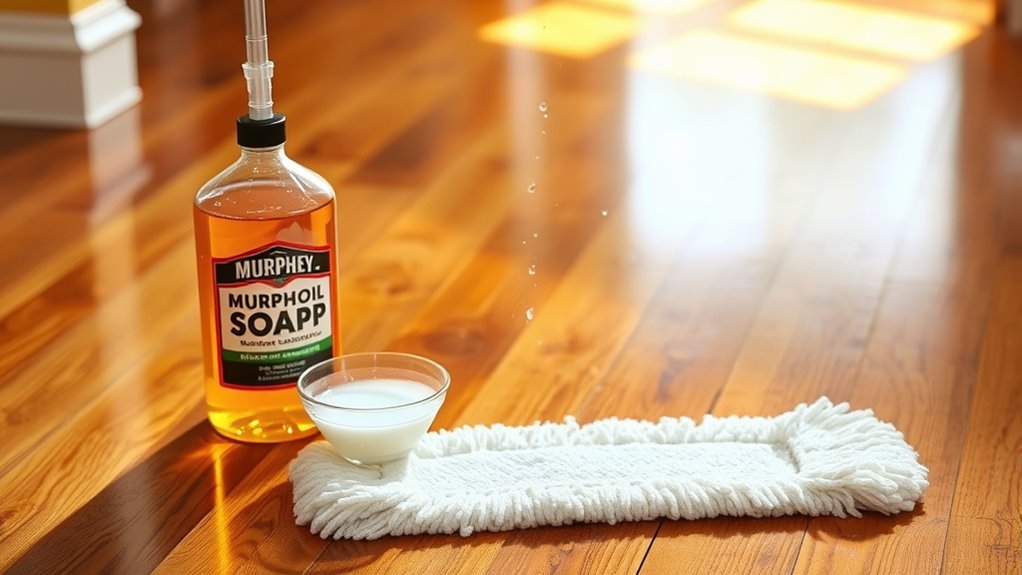
Cleaning hardwood floors with Murphy Oil Soap requires a careful approach to preserve their natural beauty and finish. Start by diluting ¼ cup of Murphy Oil Soap in a gallon of warm water—never use it full strength. Use a well-wrung mop or microfiber cloth to avoid excess moisture, which can damage wood. Wipe the floor gently in the direction of the grain for best results. Incorporate this into your maintenance routine by cleaning every one to two weeks, depending on foot traffic, to maintain a fresh, polished look without over-wetting. Between deep cleanings, a dry dust mop can help extend the time between washes. This balanced cleaning frequency guarantees your floors stay vibrant and protected, giving you freedom from constant worry over wear or damage.
Alternative Products for Hardwood Floor Maintenance
While Murphy Oil Soap is a trusted choice for many, you might want to explore alternative products tailored to your hardwood floor’s specific needs. Selecting the right cleaner guarantees longevity and preserves the wood’s natural beauty. Consider these options:
- Vinegar solution: A diluted mix (1/2 cup vinegar to 1 gallon water) gently cleans and disinfects without residue but use sparingly to avoid damage.
- Eco friendly alternatives: Plant-based cleaners designed specifically for hardwood floors offer effective cleaning without harsh chemicals.
- pH-neutral hardwood cleaners: These maintain the floor’s finish and prevent dullness.
- Microfiber mops: Ideal for dry or slightly damp cleaning, they minimize water exposure and scratches.
Choosing smart, eco-conscious products empowers you to maintain your floors safely and sustainably.

